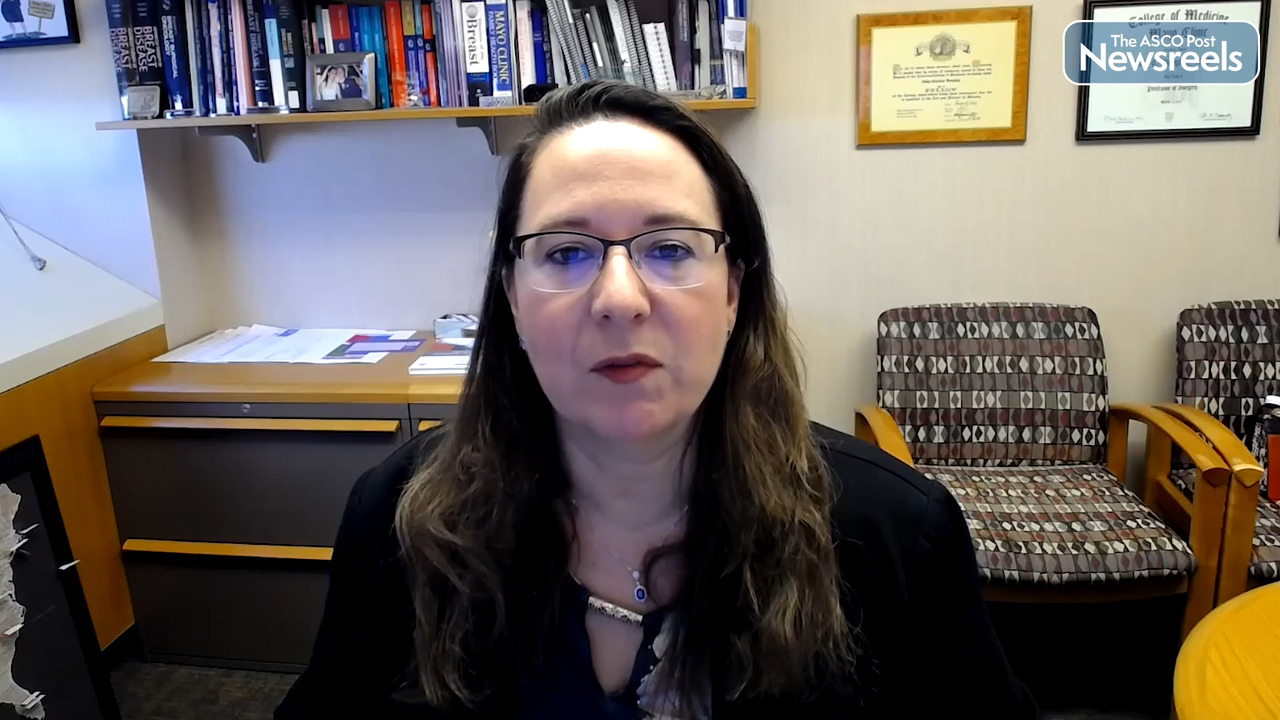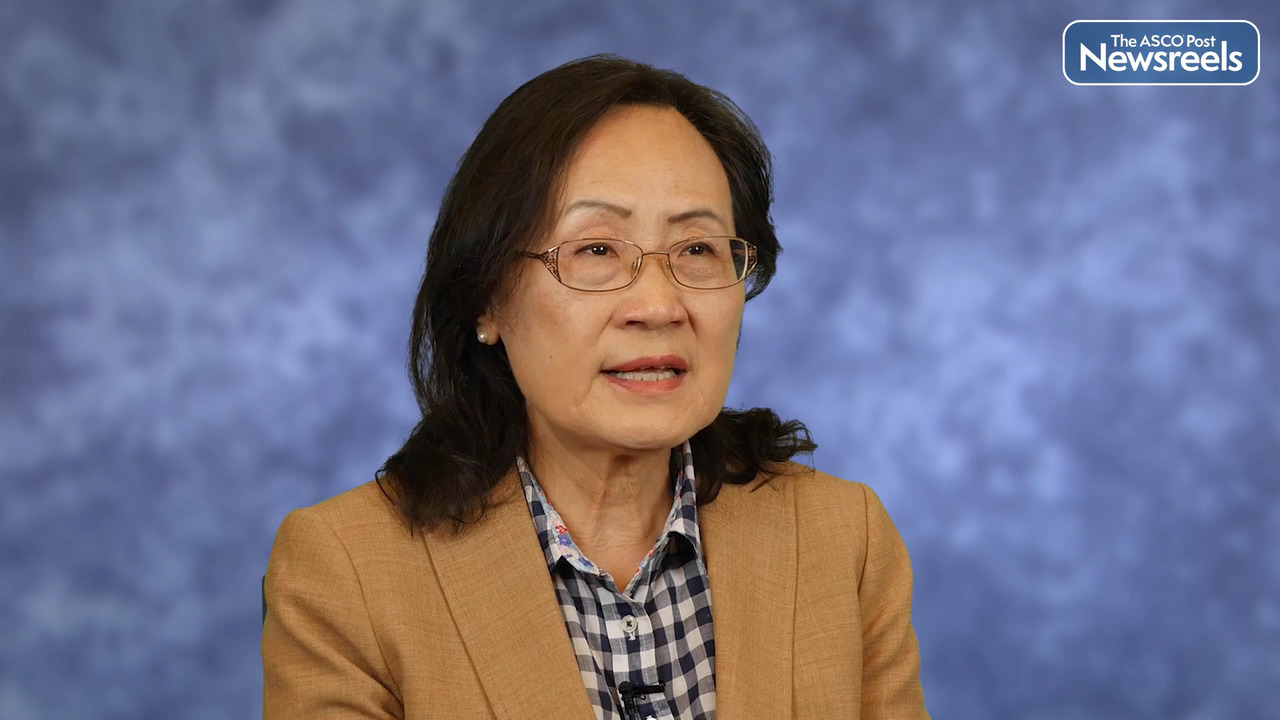Antibacterial Treatment May Resolve Acute Radiation Dermatitis in Patients With Breast Cancer Undergoing Radiation Therapy
Researchers have found that acute radiation dermatitis may involve the skin bacterium Staphylococcus aureus and that a simple, low-cost treatment may prevent severe cases in patients undergoing radiation therapy, according to two novel studies published by Kost et al—one a randomized clinical trial ...
Anita Mamtani, MD, on Axillary Dissection: For What Types of Breast Cancer Can It Be Avoided?
Anita Mamtani, MD, of Memorial Sloan Kettering Cancer Center, discusses study findings showing that axillary lymph node dissection was required by less than 2% of patients with cT1NO triple-negative or HER2-positive breast cancer having upfront surgery. There was no clear advantage of neoadjuvant chemotherapy in reducing the risk of lymph node dissection in this cohort. Upfront surgery is a suitable approach in these patients, says Dr. Mamtani, allowing for de-escalated chemotherapy regimens in patients with pathologic node-negative disease. (Abstract P1).
Kari M. Rosenkranz, MD, on Breast Cancer: Impact of Breast Conservation on Local Recurrence
Kari M. Rosenkranz, MD, of Dartmouth Health, discusses findings from the ACOSOG Z11102 (Alliance) study, which showed that breast-conserving therapy is safe for patients with multiple ipsilateral breast cancer lesions, resulting in low recurrence rates. However, omitting adjuvant endocrine therapy is a risk factor for recurrence. (Abstract 1).
Judy C. Boughey, MD, on Changes in Axillary Surgical Management: An I-SPY2 Analysis
Judy C. Boughey, MD, of the Mayo Clinic, discusses the decrease, over the past decade, of axillary lymph node dissection, especially in patients with node-positive breast cancer at diagnosis who had sentinel lymph node surgery after neoadjuvant chemotherapy. These findings are based on the records of more than 1,400 patients enrolled in the I-SPY2 trial. (Abstract 3).
pCR and Individual Patient Prognosis After Neoadjuvant Chemotherapy and Anti-HER2 Therapy in HER2-Positive Early Breast Cancer
In an analysis reported in the Journal of Clinical Oncology, Marion T. van Mackelenbergh, MD, PhD, and colleagues found that patients with early HER2-positive breast cancer who achieved pathologic complete response (pCR) on neoadjuvant chemotherapy plus anti-HER2 treatment had better overall and...
Novel Imaging Agent May Help Surgeons Detect Residual Tumor Tissue Following Breast-Conserving Surgery
Researchers have discovered that the investigational optical imaging agent pegulicianine in fluorescence-guided surgery (pFGS) may have been effective at helping surgeons identify and remove residual tumor tissue in patients with breast cancer during breast-conserving surgery, according to a novel...
Lifestyle Habits, Risk Factors, and Cancer Screening During COVID-19 Pandemic
Investigators discovered both favorable and unfavorable changes in major cancer risk factors, preventive behaviors and services, and screenings in the United States during the COVID-19 pandemic, according to a new study published by Star et al in Cancer Epidemiology, Biomarkers & Prevention....
AI-Based Decision Support Systems for Mammography
Incorrect advice offered by an artificial intelligence (AI)-based decision support system could impair the performance of radiologists at every level of expertise when reading mammograms, according to a new study published by Dratsch et al in Radiology. Background Often touted as a “second set of...
Remote Outreach May Increase Uptake of and Adherence to Cancer Screenings in Females in Rural Settings
Females in rural areas may be six times more likely to receive timely breast, cervical, and colorectal cancer screenings with remote outreach that involves interactive education and follow-up support by telephone compared with females in rural areas who don’t have remote outreach, according to a...
Preoperative MRI Scans May Not Reduce Positive Margins and Reoperations in Patients With Breast Cancer Undergoing Lumpectomy
Preoperative magnetic resonance imaging (MRI) scans were not associated with a reduction in positive margins at the tumor site or in the need to reoperate to help ensure complete tumor excision in patients with breast cancer undergoing lumpectomy, according to new findings presented by Cairns et al ...
Meta-Analysis of Outcomes With Anthracycline-Containing and Taxane-Containing Chemotherapy in Early-Stage Breast Cancer
As reported in The Lancet by the Early Breast Cancer Trialists’ Collaborative Group (EBCTCG), a patient-level meta-analysis showed that anthracycline/taxane regimens were associated with better outcomes compared with regimens excluding either drug class in patients with early-stage operable breast...
Lindsay L. Peterson, MD, on Exercise and Cancer Outcomes
Lindsay L. Peterson, MD, of the Washington University, St. Louis, discusses the value of physical activity in improving cancer prognosis, especially for patients with breast or colon cancer. Aerobic exercises and resistance training are recommended during and after treatment. Exercise may help inhibit tumor growth, improve quality of life by decreasing fatigue and anxiety, build muscle mass, increase physical function, and reduce surgical complications and treatment delays.
Intraoperative vs Postoperative Lymph Node Pathology Evaluation in Patients With Breast Cancer Undergoing Mastectomy
Patients who underwent pathology evaluation of their sentinel lymph nodes during mastectomy surgery may have been significantly more likely to receive aggressive nodal therapy than patients whose lymph node biopsies and treatment strategies were evaluated after surgery. The new findings were...
Exercise and Wellness Programs May Enhance Well-Being and Reduce Health-Care Costs in Patients With Breast Cancer
Two new studies revealed that specialized exercise and wellness programs may significantly increase physical well-being and quality of life as well as reduce health-care costs in patients with breast cancer, according to findings presented by Wonders et al and Brahmbhatt et al at the 24th American...
Does Surveillance Mammography Benefit Geriatric Patients With Breast Cancer?
Investigators have found that undergoing an annual surveillance mammography may remain common among geriatric patients with breast cancer, even in those with only a small risk of developing a second primary tumor or with significant competing mortality risks as a result of advanced age and...
Extended Antibiotic Prophylaxis May Not Prevent Infections, Improve Outcomes in Patients With Breast Cancer Undergoing Postmastectomy Breast Reconstruction
Prescribing extended antibiotic prophylaxis may not reduce the risk of infections in patients with breast cancer undergoing breast reconstruction following mastectomy, according to a new study published by Sisco et al in Plastic and Reconstructive Surgery. "Our experience suggests that...
Long-Term Cardiac Safety and Efficacy of SB3 Trastuzumab Biosimilar vs Reference Trastuzumab in HER2-Positive Early Breast Cancer
In a secondary analysis of the phase III SB3-G31-BC trial, Pivot et al found that perioperative use of the trastuzumab biosimilar SB3 was associated with a similar cardiac safety profile and similar efficacy outcomes compared with reference trastuzumab after up to 6 years of follow-up in patients...
TONSL Gene May Be Potential New Target for Breast Cancer Therapy
Researchers may have discovered a new therapeutic target for patients with breast cancer—the TONSL gene—while attempting to understand the mechanisms behind breast cancer cell pathogenesis, according to a novel study published by Khatpe et al in Cancer Research. “Most of the cancer research to date ...
Trastuzumab Deruxtecan vs Physician’s Choice in HER2-Positive Metastatic Breast Cancer Previously Treated With Trastuzumab Emtansine
As reported in The Lancet by André et al, the phase III DESTINY-Breast02 trial has shown improved progression-free survival with fam-trastuzumab deruxtecan-nxki vs physician’s choice of treatment in patients with HER2-positive metastatic breast cancer who had received prior ado-trastuzumab...
I’m BRCA-Positive and Survived Both Breast and Pancreatic Cancers
Cancer has stalked my family for generations. My mother, brother, and maternal uncle were diagnosed with melanoma. Fortunately, all survived. When my sister was diagnosed with early-stage invasive ductal carcinoma in 2010, she underwent genetic testing, which showed she was positive for the BRCA2...
Emerging Success With Novel Targeted Therapies in Endocrine-Resistant Metastatic Breast Cancer
In hormone receptor–positive breast cancer, the ability to successfully target key mediators of endocrine resistance is changing the outlook of metastatic disease in this subtype, according to Aditya Bardia, MD, MPH, FASCO, Director of Breast Cancer Research and Associate Professor at Harvard...
Racial/Ethnic Disparities in Locoregional Recurrence Among Patients With Breast Cancer Treated in the TAILORx Trial
In a retrospective post hoc analysis reported in JAMA Surgery, Olga Kantor, MD, and colleagues found that locoregional recurrence was more common among Black and Asian vs White patients with hormone receptor (HR)-positive, HER2-negative, node-negative breast cancer in the context of similar access...
Sherry X. Yang, MD, PhD, on Breast Cancer: New Recurrence Score Data From the TAILORx Trial
Sherry X. Yang, MD, PhD, of the National Cancer Institute, discusses findings from the TAILORx trial, which showed that, despite chemotherapy, patients with high recurrence scores continue to have a poor prognosis. This result suggests the need to develop new management strategies for patients with early-stage breast cancer. (Abstract LB119)
Whole-Exome Sequencing May Help Identify Individuals With Cancer Predisposition Syndromes Missed by Current Screening Guidelines
Researchers revealed that 39.2% of patients who consented to whole-exome sequencing and were identified as carriers of predisposition genes for hereditary breast and ovarian cancer or Lynch syndrome did not qualify for genetic screening under current guidelines, according to new findings presented...
Preoperative Peritumoral Infiltration of Local Anesthetic in Patients With Early Breast Cancer: Effect on Survival
In an Indian trial reported in the Journal of Clinical Oncology, Badwe et al found that peritumoral infiltration of local anesthetic prior to surgery in patients with early breast cancer was associated with improved disease-free and overall survival. As stated by the investigators, “Preventing...
Sherry X. Yang, MD, PhD, on Breast Cancer: New Recurrence Score Data From the TAILORx Trial
Sherry X. Yang, MD, PhD, of the National Cancer Institute, discusses findings from the TAILORx trial, which showed that, despite chemotherapy, patients with high recurrence scores continue to have a poor prognosis. This result suggests the need to develop new management strategies for patients with early-stage breast cancer.
Digital Breast Tomosynthesis May Improve Breast Cancer Screening Performance in Community Settings
Researchers have found that digital breast tomosynthesis may have improved breast cancer screening performance in community practices and could be effective at identifying more invasive cancers compared with digital mammography, according to a new study published by Lee et al in Radiology. The...
Pathologic Complete Response as Surrogate for Event-Free and Overall Survival in Neoadjuvant Trials in HER2-Positive Early Breast Cancer
In a study reported in the Journal of Clinical Oncology, Squifflet et al found that pathologic complete response (pCR) was a weak surrogate for event-free and overall survival in neoadjuvant trials of anti-HER2 therapy in patients with HER2-positive early breast cancer. Study Details In the study,...
Abemaciclib Expanded Indication for Adjuvant Use in HR-Positive, HER2-Negative, Node-Positive Early Breast Cancer
On March 3, 2023, abemaciclib was approved for use with endocrine therapy (tamoxifen or an aromatase inhibitor) for adjuvant treatment of patients with hormone receptor (HR)-positive, HER2-negative, node-positive early breast cancer at high risk of recurrence.1 Abemaciclib was previously approved...
Summing It Up: Neoadjuvant Therapy in Triple-Negative Disease
Here is how Dr. Sharma summed up the current state of neoadjuvant therapy in triple-negative breast cancer: The addition of an immune checkpoint inhibitor to neoadjuvant chemotherapy improves long-term outcomes. This strategy can produce a modest improvement in pathologic complete response and a...
Which Patients With Breast Cancer Can Omit Radiotherapy?
Although advances in radiation therapy have rendered this treatment modality more tolerable, they have not completely eliminated the burden of radiation-related toxicity. In an ideal setting, clinicians would be able to identify patients whose risk of recurrence is sufficiently low that they can...
Early-Stage Triple-Negative Breast Cancer: Optimizing Therapy
The management of early-stage triple-negative breast cancer has been evolving at a fast pace, thanks largely to the discovery that immune checkpoint blockade can be effective in this subtype. At the 2023 Miami Breast Cancer Conference, Priyanka Sharma, MD, Professor of Medicine, University of...
Study Examines Utility, Accuracy of ChatGPT in Offering Breast Cancer Screening Recommendations
A new study suggests that the answers generated by the artificial intelligence (AI) chatbot ChatGPT may provide correct breast cancer screening advice the vast majority of the time; however, the information is sometimes inaccurate or even fictitious, according to the report published by Haver et al ...
Deductibles, Copays May Discourage Patients From Receiving Follow-up Breast Cancer Screenings
Researchers found that 20% of patients attending breast cancer screening appointments were likely to skip additional testing after abnormal findings on their mammograms if there was a deductible or copayment involved, according to a new study published by Ngo et al in Radiology. Background...
Risk of Local Recurrence After Breast-Conserving Therapy in Patients With Multiple Ipsilateral Breast Cancer
In a phase II trial (ACOSOG Z11102/Alliance) reported in the Journal of Clinical Oncology, Judy C. Boughey, MD, and colleagues found that breast-conserving therapy was associated with a low rate of local recurrence in women with multiple ipsilateral breast cancer sites. Study Details A total of 204 ...
How Effectively Are You Helping Patients With Cancer at the End of Life?
“Providing hope when there is little to hope for is hard,” noted Hyman B. Muss, MD, Professor of Medicine and the Mary Jones Hudson Distinguished Professor of Geriatric Oncology at the University of North Carolina at Chapel Hill and the Lineberger Comprehensive Cancer Center. At the 2023 Miami...
Extended Performance of an Image-Based Short-Term Risk Model for Predicting Breast Cancer
In a Swedish case-cohort study reported in the Journal of Clinical Oncology, Eriksson et al found that an image-based short-term risk model outperformed a traditional lifestyle/familial risk–based risk model in predicting the likelihood of development of breast cancer over a 10-year period. Study...
Lower-Dose Regimens of Exemestane in Postmenopausal Patients With Stage 0 to II ER-Positive Breast Cancer
In a phase IIb trial reported in JAMA Oncology, Serrano et al found that exemestane at 25 mg three times weekly was noninferior to the standard dosing of 25 mg once daily in terms of serum estradiol reduction among postmenopausal patients with stage 0 to II estrogen receptor (ER)-positive breast...
New Prognostic Staging System for De Novo Metastatic Breast Cancer
In a study reported in the Journal of Clinical Oncology, Jennifer K. Plichta, MD, MS, and colleagues formulated a novel prognostic staging system for de novo metastatic breast cancer. Study Details The staging system was developed using data from 42,467 patients from the National Cancer Database...
Change in Frailty Status Among Older Patients Undergoing Locoregional Therapy for Early-Stage Breast Cancer
In a cohort study reported in a research letter in JAMA Surgery, Minami et al found that frailty status worsened in a sizable proportion of older patients receiving locoregional therapy—including lumpectomy or mastectomy—for early-stage breast cancer. Baseline robust status and mastectomy were...
Obesity May Contribute to Breast Cancer Risk in High-Risk Patients With BRCA Mutations
Obesity may spur DNA damage in the breast tissue of patients who carry BRCA1 or BRCA2 mutations, possibly contributing to breast cancer development in patients who are already at a higher risk of the disease, according to a new study published by Bhardwaj et al in Science Translational Medicine....
ASCO Updates Guideline on Sacituzumab Govitecan-hziy in Hormone Receptor–Positive, HER2-Negative Metastatic Breast Cancer
ASCO has released a rapid recommendation update to the guideline on chemotherapy and targeted therapy for endocrine-pretreated or hormone receptor–negative metastatic breast cancer, addressing the use of sacituzumab govitecan-hziy in patients with endocrine-resistant, hormone receptor–positive,...
DESTINY-Breast03: T-DXd Improves Overall Survival vs T-DM1 in Previously Treated HER2-Positive Metastatic Breast Cancer
As reported in The Lancet by Sara A. Hurvitz, MD, of the David Geffen School of Medicine, University of California, Los Angeles, Jonsson Comprehensive Cancer Center, and colleagues, updated results of the phase III DESTINY-Breast03 trial showed significantly improved overall survival with...
Adjuvant Accelerated Partial-Breast Irradiation vs Whole-Breast Irradiation in Early Breast Cancer: 10 Year Outcomes of Phase III Study
As reported in The Lancet Oncology by Vratislav Strnad, MD, PhD, of University Hospital Erlangen and Comprehensive Cancer Center Erlangen, Germany, and colleagues, 10-year outcomes in a phase III GEC-ESTRO (Groupe Européen de Curiethérapie and European Society for Radiotherapy and Oncology) trial...
Nuances in Breast Cancer Imaging for Screening and Surveillance
Breast cancer screening and imaging-based surveillance after treatment remain suboptimal, largely because of confusion in the guidelines and the fact that dense breasts are too often ignored, according to Elizabeth Morris, MD, FACR, FSBI, FISMRM, Professor and Chair of the Department of Radiology...
Matthew P. Goetz, MD, on Breast Cancer: Interim Survival Results With Abemaciclib Plus a Nonsteroidal Aromatase Inhibitor
Matthew P. Goetz, MD, of Mayo Clinic, discusses recent data from the MONARCH 3 trial of patients with advanced hormone receptor–positive, HER2-negative breast cancer. The study, a second interim analysis, showed that longer overall survival was observed in both the intention-to-treat group as well as in the subgroup with visceral disease. However, neither met the threshold for statistical significance, and further analyses are planned when more data can be reported. (Abstract LBA15).
Understanding Fertility Issues in Young Patients With Breast Cancer
Young women with breast cancer have many concerns about their future fertility. How confident are you in discussing their chances of a future pregnancy, the effect of breast cancer treatment and fertility interventions on these offspring, and their risk of a compromised oncologic outcome after...
Low-Dose Tamoxifen to Prevent Recurrence in Patients With Breast Noninvasive Neoplasia: 10-Year Follow-up of TAM-01 Trial
As reported in the Journal of Clinical Oncology by Lazzeroni et al, the 10-year follow-up of the Italian phase III TAM-01 trial has shown that 3 years of low-dose tamoxifen vs placebo continued to be associated with a reduced risk of recurrence of invasive breast cancer or ductal carcinoma in situ...
Addition of Fulvestrant to Alisertib in Endocrine-Resistant Metastatic Breast Cancer
In the phase II TBCRC041 trial reported in JAMA Oncology, Haddad et al found that the addition of fulvestrant to alisertib did not improve objective response rate in postmenopausal patients with HER2-negative, endocrine-resistant metastatic breast cancer. Study Details The multicenter trial,...
Large Study Finds Digital Breast Tomosynthesis May Be Superior to Digital Mammography for Breast Cancer Detection
In a study of over a million patients, digital breast tomosynthesis (DBT) showed improved breast cancer screening outcomes over screening with standard digital mammography alone. The results were published by Conant et al in Radiology. Breast cancer screening with two-dimensional (2D) digital...






